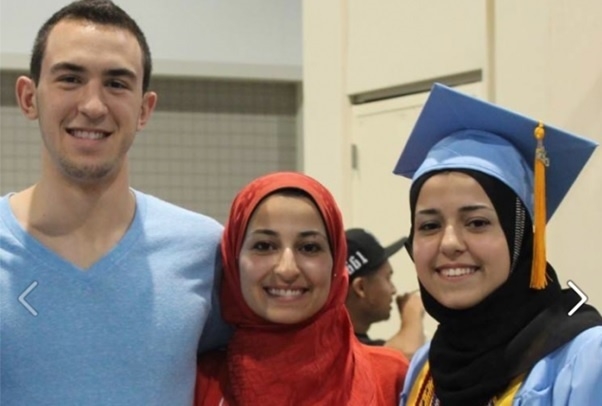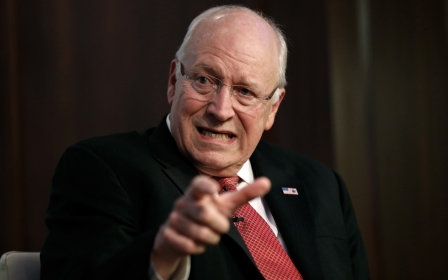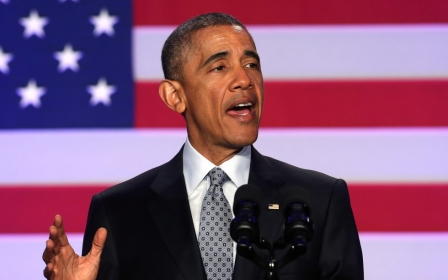Making sense of a senseless war

It was a terrible two weeks. So many fine people, committed in their own ways to justice, were taken from us too soon - and many of them so young. American international solidarity worker Kayla Mueller, 26, was killed in Syria on 6 February. That tragedy was followed by the suspected hate crime in Chapel Hill in which three young bright American Muslim students were slain: Deah Barakat, 23, Yusor Abu Salha, 21, and Razan Abu Salha, 19. Then on 11 February, a tragic car crash took the life of the fair-minded journalist Bob Simon, 73, who had done excellent reporting for over 50 years. A day before that crash, we were shocked by the death of professor Naseer Aruri, 80, an eminent scholar in the fields of human rights and Middle East studies.
Many people around the world were saddened by the death of Simon and Aruri, and sent messages lamenting the loss of the two men and recalling their achievements. Both tragedies were received as a bitter fact of life. The state of shock and rage, however, was different with the crimes that took the lives of the young victims. They were murdered intentionally by man’s will. The anger conveyed by social-media messages - as well as by the thousands who attended vigils in many countries to pay their respects and show solidarity with victims’ families - is beyond description. People from different backgrounds sharing a commitment to peace and justice tried to make sense of these senseless crimes. What is going on? Has the world gone crazy? Is this the world that we want our children to inherit?
Similar questions about other sorts of insidious crimes that are currently taking place in the Holy Land were also raised by many who attended recent talks by Jeff Halper. This Israeli activist, director of the Israeli Committee against Home Demolitions (ICAHD) has been on a month-long speaking tour across Canada. His events have attracted many concerned people from Newfoundland to Edmonton. They also came looking for an explanation. They were searching for a context and an analysis unavailable in the mainstream media. They wanted to understand the puzzle of the unfolding conflict in Israel-Palestine and its relation, if any, to the current madness.
With a detailed presentation using maps of the Occupied West Bank, Halper made it crystal clear that the vision of peace that guided the Oslo Accords has become unrealisable. The Zionist colonial project aided by the American government has completely destroyed that vision. He described the many home demolitions and land confiscations. In his view, these crimes had little to do with security and everything to do with territorial expansion. The shocked crowd left with more questions than answers.
Meanwhile, for the people of the Middle East who were born, raised and live in a condition of war, their questions are more complicated and much more serious. Their daily battles include more than seeking explanations for individual crimes. Since 2003, the situation of the people, particularly the Iraqis, Syrians and Palestinians has been bleak. Those who live in the heart of crime scenes need to exert astonishing effort just to stay alive. They have to escape the F-16 bombings and the suffocating blockade of air, sea and land. They must constantly dodge barrel bombs by running for safety. Amid that grim situation and amid a terrible reality that people around the world cannot even begin to understand, they too raise questions and seek answers - not in order to explain the madness in which they live, but rather to put an end to it.
The only way to make sense of the senseless world we have inherited is through understanding its historical context. Many wise commentators have made it clear that the invasion of Iraq in 2003 involved a monumental injustice which afflicted the entire region and carried out incalculable damage to all life there. Perhaps the most irreparable damage was done to the social fabric of not only Iraqi society, but that of the entire Middle East. The bitter fruits resulting from that invasion can explain part of the current madness.
American author and former CIA officer, Graham Fuller recently emphasised that the US invasion of Iraq helped to create the formation of the Islamic State group in Iraq and Syria. The invasion also led to the spread of sectarian conflict, radicalisation and polarisation. Kofi Anan, the former UN secretary-general, has also made the link between the US-led invasion of Iraq and the creation of IS. The destructive invasion of this country was immoral (because it was built on the lie of weapons of mass destruction) and illegal (because it occurred without the approval of the UN). It is currently an insurmountable obstacle to regional and global peace. The destruction of Iraqi society has caused the death of over an estimated three-quarters of a million people. It resulted in the displacing of over 4.7 million and fed sectarianism by empowering Shiite over Sunni by means of humiliation, torture and imprisonment. In Iraq, the prospects for harmonious development were never bright. This country was a classic case of colonial exploitation followed by imperial hegemony. Part of that exploitation was to ensure control over Iraq's enormous oil resources while reinforcing US dominance over the world's major energy-producing region. Noam Chomsky calls this forceful intervention a "sledge hammer" approach. The bitter fruit of this domination - the madness - is inevitable.
Although the US-led invasion of Iraq had catastrophic results, it was only the beginning. As early as 2012, the US was training Syrian opposition rebels in Jordan to help American - vetted fighters gain an upper hand in the uprising against Assad. As a result of this intervention by the US and other Western countries, a civil war became a larger proxy war. In March 2013, the New York Times reported that “with help from the CIA, Arab governments and Turkey have sharply increased their military aid to Syria’s opposition fighters.” There are also several reports that many of these fighters have joined IS and that many of the arms supplied by the US have ended in their hands.
This intervention has not toppled the Assad regime as US President Barack Obama had hoped. Nor has it shifted the battle in favour of the American - trained rebels. Rather, it has added additional fuel to an already existing fire and has created justification for more radicalisation, polarisation and madness. At the same time, it has done little to assist millions of Syrian refugees. In fact, the failure of states to respond to the Syrian humanitarian plight has worsened the conditions of the many victims of this intervention. Even some of those who crossed shores to help them have died. Kayla was a case in point. This aid worker and activist, who also did solidarity work in Palestine in the summer of 2010, wanted to help in the Middle East. She wasn't earning money or building a career, she was simply assisting civilians whose lives had been shattered by a proxy war. The name of her blog, Imbued with Hope, summed up her motivation.
In the eyes of ruthless criminals like IS, Kayla was an American citizen who had to be punished for her government’s destructive politics. In the eyes of the American government, Kayla was the victim of barbaric criminals. The indisputable fact, however, is that Kayla, like Rachel Corrie (the American activist crushed by the blade of the Israeli bulldozer back in 2003), was a courageous hero. Kayla’s firm commitment to justice and human dignity was also a reminder of the gruesome situation Middle Eastern people endure on daily basis. Kayla, like Rachel, exposed the hidden brutality of the occupation, the bitter results of military intervention, and the lethal effects of the ongoing imperial project.
Many people, including Halper, have made clear the link between acts of apparent madness, and the many decades of diplomacy that have failed to solve the Israeli-Arab conflict, including the utterly failed “peace process”. A Palestine that has suffered 67 years of intensive colonisation, 47 years of brutal military occupation, continuing Judaisation of its occupied land, and nine years of inhuman blockade in Gaza is becoming a fertile ground for Palestinian and non-Palestinian radicalisation - and an invitation to more madness. The level of frustration, despair and outrage among ordinary people, especially the youth is mounting. People are no longer willing to tolerate the hypercritical double-standard which the US government applies when dealing with Israel - a country that has broken all norms of international law and is still able, with the help of the US, to get away with it. These are the facts that everybody is talking about every day in the Middle East, particularly the forgotten 1.8 million people in Gaza. They currently live in a state of poverty and within a huge prison. They have many shortages, a dilapidated infrastructure, no option to leave, and few ways to earn a living. They have also been the collective victims of several types of crime, and they have seen little genuine attempt to deal with the causes of the conflict - the occupation, ethnic cleansing and apartheid.
The craziness that is happening in our world is the inevitable result of a failed US foreign policy. Military interventions by the US have weakened, if not destroyed, the prospects of a cohesive Middle Eastern society. These wars have also caused much harm and incited the formation of ruthless groups that are now threatening regional and global peace. As long as these wrongs are not addressed, the killing of more Deahs, Razans, Yusors, Rachels and Kaylas remains highly probable. They are the casualties of a cruel, uncomprehending and unwinnable imperial war.
New MEE newsletter: Jerusalem Dispatch
Sign up to get the latest insights and analysis on Israel-Palestine, alongside Turkey Unpacked and other MEE newsletters
Middle East Eye delivers independent and unrivalled coverage and analysis of the Middle East, North Africa and beyond. To learn more about republishing this content and the associated fees, please fill out this form. More about MEE can be found here.





